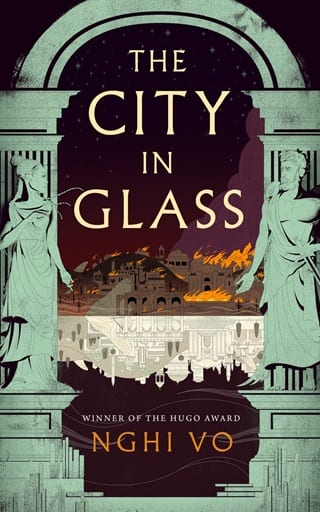Chapter Twenty-Two
TWENTY-TWO
The demands came the next day, and Vitrine read them with growing horror over the shoulders of the Lord Mayor and the council members. Her Azril, a tributary state? Her city, forced to turn away any ships from Combes, Mato Lorno, Noor, and Padri? Her children, sent to foreign wars and foreign churches? Hers made someone else’s?
It was unacceptable, and she had built well and cleverly enough that no one else in the city would permit it either.
The demands went back stuffed into the tongueless mouth of the messenger who had brought them, and the call went out immediately, to prepare for what came next. Leadership of the merchants’ private guards was hastily consolidated, trading vessels donned armor plating and rode low in the water.
Before this in Azril, war was mostly something that happened elsewhere, to other people. The old city was great friends with the mercenaries, had allies strung like pearls up and down the coast that loved her and feared each other too much to try to claim Azril for their own. Once in a while, the people would turn on each other, or more often, they would single out those who bore the mark of a foreigner in some way or another, different, too unlike to be tolerated when just a few days ago, they had eaten the same fish, went to the same coffee shops, and danced together the steps of the ganli.
Vitrine was philosophical about the blood that occasionally ran in the streets, but war was something different. War had driven her from Saqarra in the south, which was nothing anymore but jokes for the jackals and tragedy for the historians. Now the cannon fire, the bodies hung from poles, and the full beds in hastily erected infirmaries stirred up things that she had deliberately and ruthlessly forgotten.
What emerged from the muck in her mind, slow-blooded and remorseless as the catfish gods that swam in the river, reached out cold hands and sharp hooks for her. As the siege wore on, she mired in her ghosts, dragged down and made still.
Vitrine’s hands were slow when she joined the cannon teams, and when she put her ear to the ground to listen for sappers beyond the wall, the only thing she heard were the commands to retreat in Kanaian, which was spoken in her lost city and had not been heard in the world for four hundred years or more.
I wonder if there are still some nomadic nations that speak it, at least as a trade language, Vitrine wondered, her feet dragging as she walked in the streets. They were the ones who gave it to us first, maybe they carry it still. Would they come to Azril if I asked, would they bring it here with their indigo dye and their skills with scarification? They were so very beautiful.
She looked up from her reverie to find that two weeks had passed. Azril captured the general’s son, a dreamy- eyed youth who they hanged from the walls in fury and vengeance. It was a quick thing, ill-considered and hasty. In apology, she waited with him on the wall until his mother, dead of devil’s daughter poison delivered by a jealous mistress, came to pick him up.
The youth and his mother were exactly what she would have wanted for Azril in better times, and she would have written their names in her book with such beautiful inks if her hand, shaking all the time now, could remember how to write at all.
It was too loud and too bloody for her to take her book out. Her book was too fragile, her hand too unsure. Instead as the war tumbled on, she left it locked inside glass, refusing to add more to it, refusing to let it remind her of what she had written in its pages. She watched in slight befuddlement as the observatory came down, one terrible enemy cannon seeming to seek it out for malicious destruction.
“What a shame,” Vitrine said out loud, walking barefoot over the shattered glass and melted brass. The astronomers were covered up with the heavy felt cloths that had once protected the great lenses. The lenses didn’t need them anymore, and Vitrine wondered at the water on her face that fell with no rain in the sky.
The war continued. People died, terribly and easily, both those who were mourned and those who were not. Soon enough, the weight of grief blotted out everything that was not rage, and the balance of the two fueled each other, kept up with the dreary cannonade and made the slow starvation of the people of Azril a little more bearable until of course it wasn’t. Vitrine could have told them that they could eat only rage so long before it was fatal, but by then, she had stopped talking, even to herself.
Help was coming from Padri. It arrived in the form of a single ship of mercenaries and expectations of extravagant thanks should Azril survive.
Help was coming from Combes, but it was blown off course, or perhaps it was never sent at all.
Vitrine knew that help never came, and as the cold winds descended, the invaders breached the city wall, streaming through the break five hours before dawn.
By then, Vitrine had been sitting on the front steps of the library ruins for three weeks, crouched in on herself, wondering if the sea would take Azril like the sand had taken Saqarra, wondering if this time it would take her too. She curled around the book inside her, still not daring to take it out, and the blood in the streets rose up to lap at her bare toes.
She barely noticed when the most recent Malabec Mercer used what was left of the library for a last stand, and she didn’t look up when a gentle hand touched her shoulder, tugging back the wool scarf she had pulled over her head to make sure it was really her.
The angel had to come overland, because no ships would sail to Azril, and coming into the city, he had picked up a sword. He swung it in an arc that reflected his terrible light, and he took the burning fumes of the city into himself with a deep breath, eyes kindling dragons.
“Tell me I can,” he said, and for an instant, he thought she was too far gone, too sunk in horror and pain to respond, but she rose, moving like a statue would move if it could.
Vitrine stood on the last intact and unbroken part of the library stairs, and she pointed towards the fighting, her arm as straight as a spear. She could no longer speak, and it was only dirt and blood on her face because her tears had gone somewhere else, but it was enough, and the angel turned.
Vitrine felt his wings beating frantically against the glass, and she wrapped her arms around her chest as if they might escape. She watched as he dropped his human guise, stood up bright and burning as he had so long ago.
Will you give way? he had asked her, and she never had.
He could not soar above the city, but she could no more take away his faculty for destruction than she could take the breath out of the air or the salt from the sea. The sword he carried was nothing more than will sharpened, and death ran after him like a child trying to keep up.
The screams went up, and the tides of the people in the street turned. Vitrine knew that he had been too long away, that he would not always be able to tell invader from citizen, her people from those who had come to conquer them.
The angel walked fast in Azril, and those who were faster than he was gained the wall. They escaped through the breach and through gates both common and secret, they escaped to sea, and he let them go. Those who saw him pass remembered different things, and afterwards they dreamed of him, love without mercy and fury without holiness.
An hour before dawn, an eerie quiet swept over Azril like a velvet cloth over a half-finished game of dominoes. It had never been so silent before except that terrible morning after Summersend, but it was not dead. It was only that ev eryone who still lived in the city, citizen and invader alike, was crowded as still as stone in cellars, in midden heaps, in belfries, and in barrels. They were made all alike by terror, and in the years to come, it would bind them together until they could imagine no allegiance save what was forged under the fear of the angel’s terrible love.
The angel made three rounds of the city, and finally he returned to the library, where Vitrine stood waiting for him.
“It’s done,” he said, gesturing to the ruin behind him.
Vitrine nodded, because whatever other flaws the angel was prey to, dishonesty was not one of them.
“All right. Do you want to be free?”
She spread her hand, and his wings, faintly pearly even in the darkest part of the night, rose up over her head, as perfect as the day she had taken them.
The angel looked away.
“I don’t want you to ask me that.”
She folded his wings away again as neatly as a conjurer disappearing a dove or a cartographer erasing a road or a town.
“What do you want?”
It was not, Vitrine imagined, a question that was often asked of angels. She waited and waited, patient as she could be for things that mattered.
“I want,” he said carefully, “for you to love me as I love you.”
In her chest, his wings fluttered and her book opened, as if a strong and wild wind were riffling its pages. Her book was heavy and the pages, though marked with ink and mud and blood, could bear many more names. When it appeared in her hands, as solid as iron, the angel’s head came up, but she closed it firmly, shaking her head, making it disappear again.
“I don’t care about your name,” she said. “Come here.”
He followed her over the shattered door of the library, walking between the two pillars of pink Padri marble, somehow still standing. The foyer drifted with paper scraps as deep as mountain snow, heresies and romances and theological speculations and recipes all mingling with abandon. Resting in one drift of paper was Malabec Mercer, and as she passed, Vitrine straightened his limbs and kissed his forehead. He had been in her book since he was a toddler, and she would mourn him later and ever afterwards.
The library’s atrium, wide enough for a dozen couples to dance the ganli without ever touching, rose up three stories overhead, and dead bodies littered the marble floor and marksmen hung dead over the mezzanine railings. All was shrouded with shattered glass from the rose window far above. The window had drenched the atrium in blue and gold light when the sun shone down, but now it was open to the night, the last stars, the scudding clouds.
“Come here,” Vitrine said again, and she lay down on her side in the broken glass, the body of a fifteen-year-old mercenary from Noor five paces from her head and the body of a librarian a dozen paces from her feet.
Hesitantly, the angel came to rest on his side facing her. He smelled of sweat and blood, or rather, his clothes did. When Vitrine leaned into bury her nose in his throat, he smelled like a cold winter day, of sunlight banishing rot.
“I don’t know how—”
“You’ll learn.”
She embraced him carelessly, letting the shattered glass cut her bare arms and legs, heedless of the dust that threatened to choke her. She kissed him with hundreds of years of passion, not all of it fond, and she pressed herself to his body, which was for love of her losing its memory of skin and of blood.
“I love you so, I love you best,” she whispered, nipping firmly at his ear. “I will walk in you, and I will care for you, and I will bring the whole world to rejoice in you.”
The angel sighed, a noise like the turning of pages, like the gust of air closed out of a heavy leather-bound grimoire. He rolled over on his back, his hands down by his sides, and Vitrine found in his skin the brown marble from Padri, in his nails the steel fittings from Combes.
She slid one strong thigh over his, perching on his hips and leaning down to kiss the column of his throat, splitting his shirt to find his skin.
The angel tasted of love and also of fear and of hope, sweet and bitter at once and making her mouth water for more. He cried out in offense when she bit him too hard, leaving a tender spot to the right of where his navel would be, and she laved the stinging with her tongue, not in apology but because bruised flesh tasted good to her as well.
Underneath her, the angel’s body grew taut and tense, his hands opening and closing as she kissed him and touched. He was growing colder now, and stretching out beyond her as well, blood and bone and will and fear and hope straining to the limits of his skin and then passing through them. They bound books in human skin some times, but angel skin could bind something different, and Vitrine smiled.
“I love you so, I love you best,” she whispered, and under her hand, he groaned, shaking with the pleasure that dripped like anchoress honey from her fingertips. She rose him up to suit her expert eye, letting the heat of him, akin to what lit the stars, work to turn bone to granite, blood to wood.
Vitrine’s breath caught in her throat as something low and deep in her belly went tense, and she sat up straight, looking at the black night sky in the shattered window above. The circular opening ringed with toothy glass shards looked back at her, and the angel’s hands came up to touch her with fearful devotion, sliding over her skin with increasing confidence.
“Oh yes,” she said in brief surprise. She would love him, and more than she had thought she would, but that was the way of loving most things. You couldn’t portion love out in spoons or cups or slices. You could only let it grow and nurture it if you could, cut it down if you had to.
The angel, stretched almost to bursting already, opened to her with a shy and gossamer flutter, and then she could shape him as easily as her sister shaped her own face, as easily as her brother shaped coral palaces beneath the sea. She wanted granite for the exterior and marble for the interior, she wanted shelves fanned out like the rays of the sun itself from the atrium, which after all was only a chambered heart opening the way to all the rest.
He was open, he was folded and spun and stretched and mauled until there was nothing left of an angel that looked like a man, until the marble floor spread from him like blood and pillars like bone rose up to support the vaulted ceiling. His mouth opened, he cried out, and it was not for holiness but for her, all for her.
Exhausted, filthy, and exalted, Vitrine fell to her back on the cold clean floor, her arms spread wide as if for an em brace, breathing in the air that was heavy with the scent of vellum and leather and polished wood. She stared up at the unbroken window high above, amber now instead of blue, and she smiled because she knew he saw her. She had used his eye to make it, blowing it out with a puff of air until the color was thin but true.
Beyond the walls of the library, the people were beginning to move again, coming out of their hides. They would reckon what they had lost, whether it was to a lovesick angel or to an enemy sword. They would find out what was left, and they would mourn what had gone. Sooner or later, they would begin to repair what was broken.
That was for tomorrow, however, and right now, Vitrine climbed to her feet, looking around at her library with wonder and pleasure. There were very few things that emerged into the world perfect from a dream, but this was one of them, shaped in all its particulars to what she had seen for her city hundreds of years ago. It was a library, and it was an angel, and nothing of this world could destroy it. The city would rise and fall, but the library would stay.
Vitrine smiled, and then reaching past a pair of quiet gray wings, she took out her book. She touched the paper lovingly, flipping from the pages that were marked to the ones that were empty. She would return to write in the book many more times, enough that soon she might need a new book, and she found herself looking forward to it. There were wonders ahead, and monsters and miracles as well.
“I love you so, I love you best,” she whispered, three times true.
 Fullepub
Fullepub 



